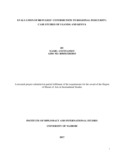| dc.description.abstract | The Horn of Africa experiences an ever growing insecurity resulting from civil wars, hunger and famine, political persecution, and many other challenges. This have in turn resulted in swelling numbers of refugees. This study examines the impact of hosting refugees on Kenya and Uganda‟s socio-economic and political sectors and also on the security and stability of the Horn of Africa region. Through an analysis of secondary data and personal experiences, the study found that Kenya and Uganda have borne the brunt of hosting refugees resulting from numerous conflicts in the region including in South Sudan, Burundi, and Somalia. The study, however, also found that refugee camps have contributed to the economy of local communities by creating a ready market for goods and services and in Uganda where they are allocated land, have grown crops and livestock for sale to local communities. Politically, the study found that refugees have been exploited for political reasons, using them as voters in Northern Kenya and enlisting them in resistance movements in Uganda. In terms of regional security and stability, the study found a correlation between refugees and insecurity. Both Kenya and Uganda have fallen victims to terrorist acts that have claimed lives and which the respective governments have attributed to refugee elements from Somalia. Constant hostility with host communities, environmental degradation and illegal movement of small arms in the two countries have also been attributed to refugees, and seen as factors causing destabilization of the region. In terms of state challenges, in responding to refugee problem include the inability of local governments to cater for all needs of refugees due to weak economies and scarcity of resources, as well as lack of enough security personnel to provide security to the refugee camps. The study recommends that states provide security and adhere to international regimes while dealing with refugees. It also called states to positively contribute to the economies of their host state and work with security agencies to curb insecurity related to refugee activities. Refugee agencies are also called upon to balance between the needs of local communities and refugees and tackle stereotypes concerning refugees among local communities. | en_US |



